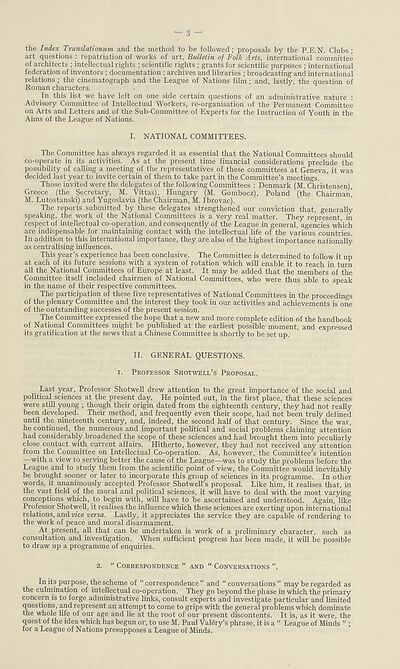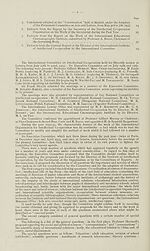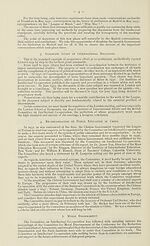International > Report by the committee on the work of its ... plenary session > Fifteenth plenary session
(3)
Download files
Complete book:
Individual page:
Thumbnail gallery: Grid view | List view

— 3 —'
the Index Translationum and the method to be followed ; proposals by the P.E.N. Clubs ;
art questions : repatriation of works of art, Bulletin of Folk Arts, international committee
of architects ; intellectual rights ; scientific rights ; grants for scientific purposes ; international
federation of inventors ; documentation ; archives and libraries ; broadcasting and international
relations ; the cinematograph and the League of Nations film ; and, lastly, the question of
Roman characters.
In this list we have left on one side certain questions of an administrative nature :
Advisory Committee of Intellectual Workers, re-organisation of the Permanent Committee
on Arts and Letters and of the Sub-Committee of Experts for the Instruction of Youth in the
Aims of the League of Nations.
I. NATIONAL COMMITTEES.
The Committee has always regarded it as essential that the National Committees should
co-operate in its activities. As at the present time financial considerations preclude the
possibility of calling a meeting of the representatives of these committees at Geneva, it was
decided last year to invite certain of them to take part in the Committee's meetings.
Those invited were the delegates of the following Committees : Denmark (M. Christensen),
Greece (the Secretary, M. Vittas), Hungary (M. Gombocz), Poland (the Chairman,
M. Lutostanski) and Yugoslavia (the Chairman, M. Ibrovac).
The reports submitted by these delegates strengthened our conviction that, generally
speaking, the work of the National Committees is a very real matter. They represent, in
respect of intellectual co-operation, and consequently of the League in general, agencies which
are indispensable for maintaining contact with the intellectual life of the various countries.
In addition to this international importance, they are also of the highest importance nationally
as centralising influences.
This year’s experience has been conclusive. The Committee is determined to follow it up
at each of its future sessions with a system of rotation which will enable it to reach in turn
all the National Committees of Europe at least. It may be added that the members of the
Committee itself included chairmen of National Committees, who were thus able to speak
in the name of their respective committees.
The participation of these five representatives of National Committees in the proceedings
of the plenary Committee and the interest they took in our activities and achievements is one
of the outstanding successes of the present session.
The Committee expressed the hope that a new and more complete edition of the handbook
of National Committees might be published at the earliest possible moment, and expressed
its gratification at the news that a Chinese Committee is shortly to be set up.
II. GENERAL QUESTIONS,
i. Professor Shotwell’s Proposal.
Last year, Professor Shotwell drew attention to the great importance of the social and
political sciences at the present day. He pointed out, in the first place, that these sciences
were still young ; though their origin dated from the eighteenth century, they had not really
been developed. Their method, and frequently even their scope, had not been truly defined
until the nineteenth century, and, indeed, the second half of that century. Since the war,
he continued, the numerous and important political and social problems claiming attention
had considerably broadened the scope of these sciences and had brought them into peculiarly
close contact with current affairs. Hitherto, however, they had not received any attention
from the Committee on Intellectual Co-operation. As, however, the Committee’s intention
—with a view to serving better the cause of the League—was to study the problems before the
League and to study them from the scientific point of view, the Committee would inevitably
be brought sooner or later to incorporate this group of sciences in its programme. In other
words, it unanimously accepted Professor Shotwell’s proposal. Like him, it realises that, in
the vast field of the moral and political sciences, it will have to deal with, the most varying
conceptions which, to begin with, will have to be ascertained and understood. Again, like
Professor Shotwell, it realises the influence which these sciences are exerting upon international
relations, and vice versa. Lastly, it appreciates the service they are capable of rendering to
the work of peace and moral disarmament.
At present, all that can be undertaken is work of a preliminary character, such as
consultation and investigation. When sufficient progress has been made, it will be possible
to draw up a programme of enquiries.
2. “ Correspondence ” and “ Conversations
In its purpose, the scheme of “ correspondence ” and “ conversations ” may be regarded as
the culmination of intellectual co-operation. They go beyond the phase in which the primary
concern is to forge administrative links, consult experts and investigate particular and limited
questions, and represent an attempt to come to grips with the general problems which dominate
the whole life of our age and lie at the root of our present discontents. It is, as it were, the
quest of the idea which has begun or, to use M. Paul Valery’s phrase, it is a “ League of Minds ” ;
for a League of Nations presupposes a League of Minds.
the Index Translationum and the method to be followed ; proposals by the P.E.N. Clubs ;
art questions : repatriation of works of art, Bulletin of Folk Arts, international committee
of architects ; intellectual rights ; scientific rights ; grants for scientific purposes ; international
federation of inventors ; documentation ; archives and libraries ; broadcasting and international
relations ; the cinematograph and the League of Nations film ; and, lastly, the question of
Roman characters.
In this list we have left on one side certain questions of an administrative nature :
Advisory Committee of Intellectual Workers, re-organisation of the Permanent Committee
on Arts and Letters and of the Sub-Committee of Experts for the Instruction of Youth in the
Aims of the League of Nations.
I. NATIONAL COMMITTEES.
The Committee has always regarded it as essential that the National Committees should
co-operate in its activities. As at the present time financial considerations preclude the
possibility of calling a meeting of the representatives of these committees at Geneva, it was
decided last year to invite certain of them to take part in the Committee's meetings.
Those invited were the delegates of the following Committees : Denmark (M. Christensen),
Greece (the Secretary, M. Vittas), Hungary (M. Gombocz), Poland (the Chairman,
M. Lutostanski) and Yugoslavia (the Chairman, M. Ibrovac).
The reports submitted by these delegates strengthened our conviction that, generally
speaking, the work of the National Committees is a very real matter. They represent, in
respect of intellectual co-operation, and consequently of the League in general, agencies which
are indispensable for maintaining contact with the intellectual life of the various countries.
In addition to this international importance, they are also of the highest importance nationally
as centralising influences.
This year’s experience has been conclusive. The Committee is determined to follow it up
at each of its future sessions with a system of rotation which will enable it to reach in turn
all the National Committees of Europe at least. It may be added that the members of the
Committee itself included chairmen of National Committees, who were thus able to speak
in the name of their respective committees.
The participation of these five representatives of National Committees in the proceedings
of the plenary Committee and the interest they took in our activities and achievements is one
of the outstanding successes of the present session.
The Committee expressed the hope that a new and more complete edition of the handbook
of National Committees might be published at the earliest possible moment, and expressed
its gratification at the news that a Chinese Committee is shortly to be set up.
II. GENERAL QUESTIONS,
i. Professor Shotwell’s Proposal.
Last year, Professor Shotwell drew attention to the great importance of the social and
political sciences at the present day. He pointed out, in the first place, that these sciences
were still young ; though their origin dated from the eighteenth century, they had not really
been developed. Their method, and frequently even their scope, had not been truly defined
until the nineteenth century, and, indeed, the second half of that century. Since the war,
he continued, the numerous and important political and social problems claiming attention
had considerably broadened the scope of these sciences and had brought them into peculiarly
close contact with current affairs. Hitherto, however, they had not received any attention
from the Committee on Intellectual Co-operation. As, however, the Committee’s intention
—with a view to serving better the cause of the League—was to study the problems before the
League and to study them from the scientific point of view, the Committee would inevitably
be brought sooner or later to incorporate this group of sciences in its programme. In other
words, it unanimously accepted Professor Shotwell’s proposal. Like him, it realises that, in
the vast field of the moral and political sciences, it will have to deal with, the most varying
conceptions which, to begin with, will have to be ascertained and understood. Again, like
Professor Shotwell, it realises the influence which these sciences are exerting upon international
relations, and vice versa. Lastly, it appreciates the service they are capable of rendering to
the work of peace and moral disarmament.
At present, all that can be undertaken is work of a preliminary character, such as
consultation and investigation. When sufficient progress has been made, it will be possible
to draw up a programme of enquiries.
2. “ Correspondence ” and “ Conversations
In its purpose, the scheme of “ correspondence ” and “ conversations ” may be regarded as
the culmination of intellectual co-operation. They go beyond the phase in which the primary
concern is to forge administrative links, consult experts and investigate particular and limited
questions, and represent an attempt to come to grips with the general problems which dominate
the whole life of our age and lie at the root of our present discontents. It is, as it were, the
quest of the idea which has begun or, to use M. Paul Valery’s phrase, it is a “ League of Minds ” ;
for a League of Nations presupposes a League of Minds.
Set display mode to:
![]() Universal Viewer |
Universal Viewer | ![]() Mirador |
Large image | Transcription
Mirador |
Large image | Transcription
Images and transcriptions on this page, including medium image downloads, may be used under the Creative Commons Attribution 4.0 International Licence unless otherwise stated. ![]()
| League of Nations > International > Report by the committee on the work of its ... plenary session > Fifteenth plenary session > (3) |
|---|
| Permanent URL | https://digital.nls.uk/195324342 |
|---|
| Attribution and copyright: |
|
|---|---|
| Shelfmark | LN.XII.5 |
|---|---|
| Shelfmark | LN.XII |
|---|
| Description | Over 1,200 documents from the non-political organs of the League of Nations that dealt with health, disarmament, economic and financial matters for the duration of the League (1919-1945). Also online are statistical bulletins, essential facts, and an overview of the League by the first Secretary General, Sir Eric Drummond. These items are part of the Official Publications collection at the National Library of Scotland. |
|---|---|
| Additional NLS resources: |
|

